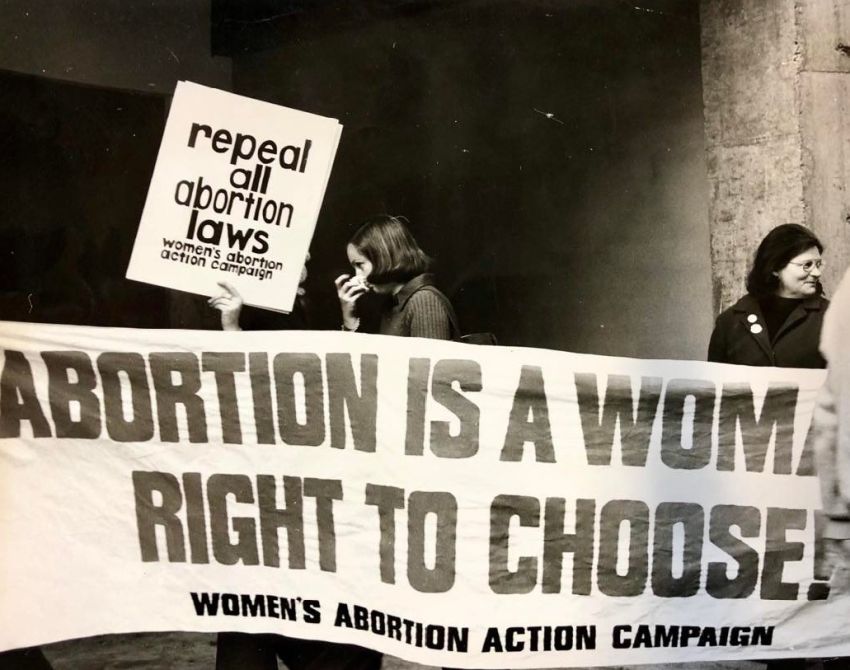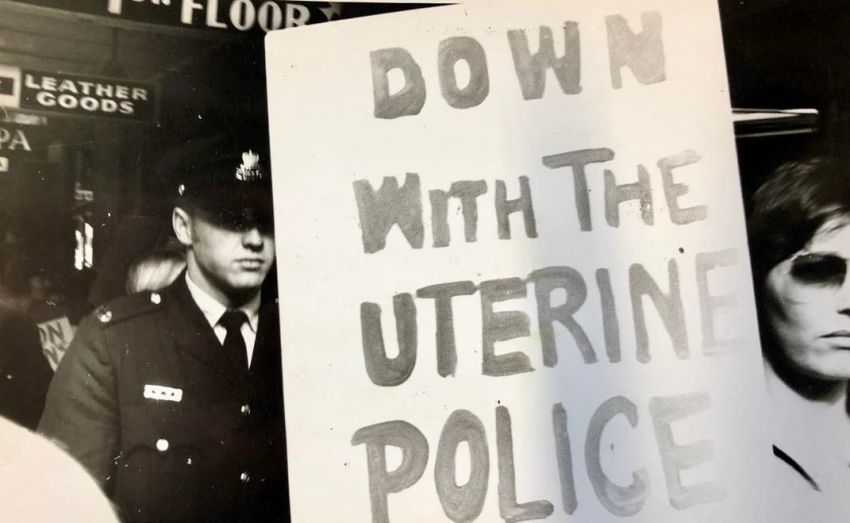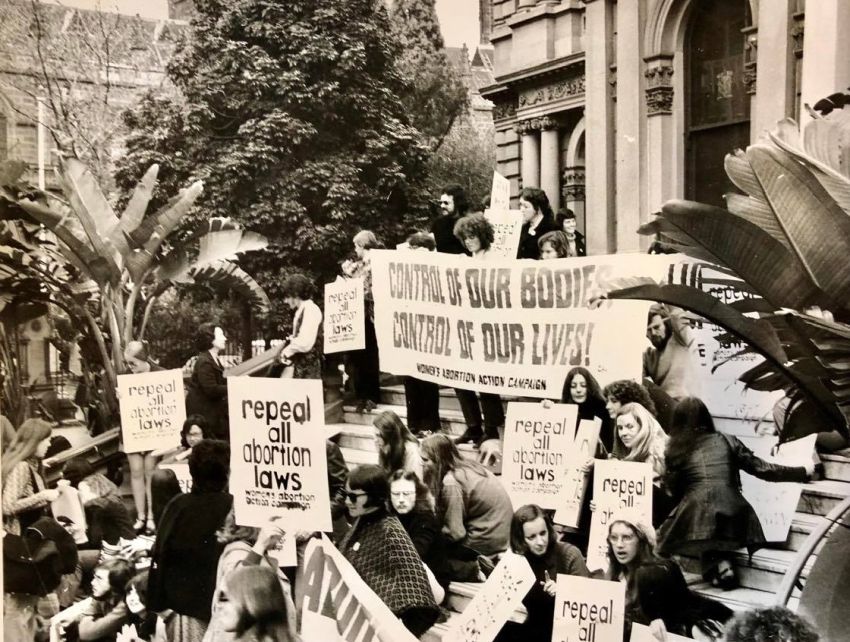
The Women’s Abortion Action Campaign (WAAC) was launched in 1972 when abortion was illegal under the New South Wales Crimes Act 1900. Three notorious provisions made it illegal for anyone, including the woman, to procure an “illegal” abortion, with sentences of up to 10 years imprisonment.
People were routinely jailed for performing abortions in the early 20th century. Such cases usually came to light because a woman would die — often horribly — after seeking an abortion.
Often, medically untrained “backyard abortionists” tried to avoid detection by relocating frequently, often to unhygienic places and using makeshift items, such as knitting needles, instead of medical instruments.
Perforated uterus, haemorrhage and septicaemia claimed the lives of many victims of the backyard abortionists.
For those who could afford it, some qualified doctors performed illegal abortions. But, as the risk to the doctor was great, so was the cost. Few could afford it.
For some lucky women, a medical condition would be claimed, the abortion called a “D&C” (dilation and curettage)and the procedure done in a hospital.
Abortions were expensive: in 1920, a backyard abortionist in Sydney charged up to £10 (the average weekly wage was £4), not just because of risk but because abortionists were also victims of widespread police corruption, which reached to the highest levels.
Doctors who performed abortions paid cops to prevent loss of licence and reputation, backyard abortionists to avoid prison.
Change was in the air by the 1970s. Corruption and women’s deaths disgusted the public and brought a new awareness about the need for change.
A legal case in Victoria in 1969 — the Menhennitt Ruling — established in law that abortion could be “necessary” and “proportionate”.
NSW Justice Aaron Levine ruled in 1971 that abortion was legal under certain circumstances, extending reproductive rights a little more.
WAAC is formed
A group of women at the University of Sydney called a meeting in 1972 to form a group to push for favourable change to abortion and reproductive rights.
From the beginning, the Women's Abortion Action Campaign (WAAC) wanted abortion to be repealed from the 1900 Crimes Act. The activists also wanted free, safe contraception and an end to the disgraceful practice of forced sterilisation.
As well as students, many working women (both in the home and outside) attended this and subsequent meetings. They decided on five basic demands: Abortion is a woman’s right to choose; Repeal of all abortion laws; Free, safe abortion on demand; Free, safe contraception on demand; and No forced sterilisation.
Despite the many changes in law over 50 years, they remain as relevant today as they did 50 years ago.
WAAC organised many demonstrations over the next 10 years and became part of the lively activism at Sydney’s Women’s Liberation House.
WAAC published the Right to Choose newsletter in hard copy format until the early 2000s and in email form for a few years longer. It always worked with like-minded organisations and individuals, including politicians, to keep the fight for abortion rights visible.

Protests important
The early years of street marches and demonstrations set a pattern. WAAC took part in International Women’s Day and Reclaim the Night protests, the Sydney Women’s Marches, it protested the NSW Foetal Personhood Bill and opposed 40 Days For Life groups, which harassed clinic staff and patients.
WAAC’s Herstory Week event in 2005 showcased its ongoing work. It hosted the Sydney launch of Lost, a book about Victorian abortion rights campaigner Dr Bertram Wainer’s work.
Free movie nights were organised to show the brilliant films After Tiller, about abortion provision in the United States after Dr George Tiller’s assassination and, partnering with the Socialist Alliance to show Vessel, about the ship which travels the world providing abortions where they are illegal or inaccessible.
WAAC wrote lots of submissions, including for Senator Natasha Stott-Despoja’s bill to demand truth in advertising for fake “pregnancy counselling” telephone services and Victoria’s 2007 abortion decriminalisation bill.
Over the decades, its members wrote to every member of both houses of parliament in each state, as well as to federal MPs.
Two separate bills trying to put foetal rights into law in NSW prompted WAAC to march again, as well as write articles, do radio interviews and organise rallies.
Solidarity shown
WAAC members travelled to Cairns in 2010 to support a couple charged with abortion-related crimes, and organised a solidarity rally in Sydney.
WAAC has worked with politicians seeking to protect and improve reproductive rights in NSW, including Penny Sharpe, Dr Arthur Chesterfield-Evans, Dr Meredith Burgmann and Dr Mehreen Faruqi.
It attended a round table with Labor MP Sophie Cotsis and, on several occasions across the decades, worked with a coalition of other organisations to push for abortion to be removed from the Crimes Act.
WAAC received a scholarship from US women’s rights organisation NOW in the mid-1990s which it used to publish an index to Right To Choose. Working with Catholics for Choice and other faith-based organisations, WAAC has also published pamphlets about the views of abortion from various religions.
WAAC has held workshops and stalls at the student-based Network of Women Students Australia and The F Conference and has been privileged to be invited to speak with groups such as The Sydney Feminists and Colectivo Mujero.
WAAC continues to work with the Philippines-based Women’s Safe Abortion Campaign to support the International Day for Women’s Health and International Safe Abortion Day.
WAAC was honoured to host the late Justice David Levine AO QC on the 40th anniversary of the Levine Ruling in 2011, where he spoke of his father’s famous decision and its aftermath. Other speakers included Dr Caroline Costa, former MLC Burgmann and women’s health advocate Samantha Campbell.
It organised tributes to Steve Rogers, the security guard killed at the East Melbourne Fertility Clinic in July 2001 by a violent anti-abortion fanatic.
Working with Radical Women (Melbourne), Pro-Choice Collective (Queensland) and South Australian activists, WAAC ran a three-day national abortion rights conference in Sydney in 2010, at which historian Dr Kate Gleeson and others spoke.
Along with other activists WAAC stayed up into the early hours in 2019 to witness the NSW Parliament overwhelmingly decide to remove abortion from the Crimes Act.
WAAC recently supported Newcastle activist Larissa Field’s protest at the closing of the city’s largest abortion clinic and helped host an online information session where representatives of MSI Australia, Family Planning NSW and Rural Doctors spoke.
Struggle continues
The pandemic led WAAC to focus on producing a website with information on the struggle and to honour those who made contributions.
WAAC has also begun to review its vast trove of documents, memorabilia and photographs. A plan for archiving and digitisation has been formulated and a professional archivist employed to sort and catalogue. Next, funds need to be raised to digitise the documents, photographs, newsletters and WAAC’s historic banners.
New opportunities for online action mean that WAAC members will not have to make long train trips in the early hours to stand outside clinics holding banners any more. But we will ensure our resources are freely available for all and provide support as needed.
Times change, but WAAC has never forgotten the work of generations of grassroots activists that led to today’s successes.
WAAC is proud to pass the baton to younger activists who have already achieved so much. We are confident that our five bold but realistic demands from 1972 are a sound roadmap.
[Christine Smith a reproductive rights activist. Women’s Abortion Action Campaign will celebrate 50 years of activism on September 3 with Penny Sharpe MLC, long-time WAAC activist Margaret Kirkby and Newcastle activist Larissa Scully. There will be zoom links set up. More information can be found here.]
